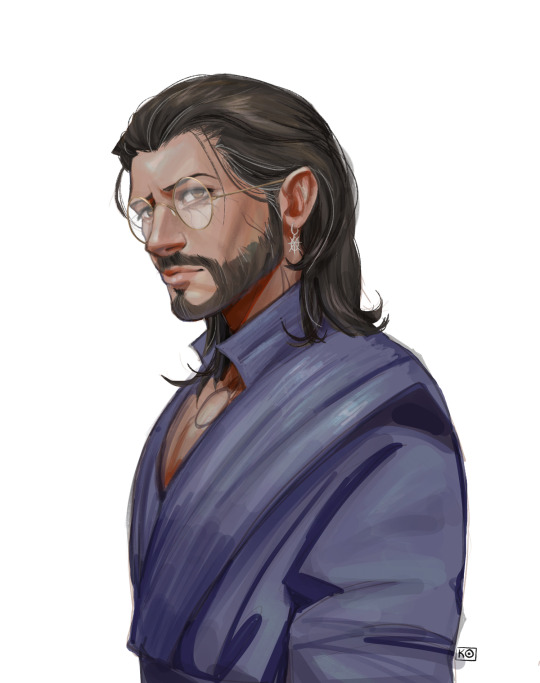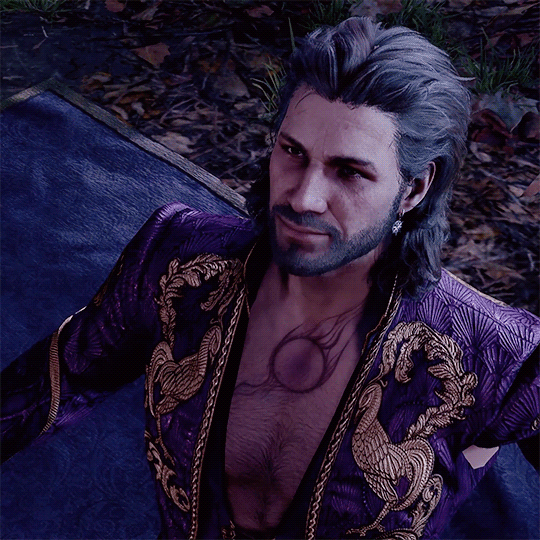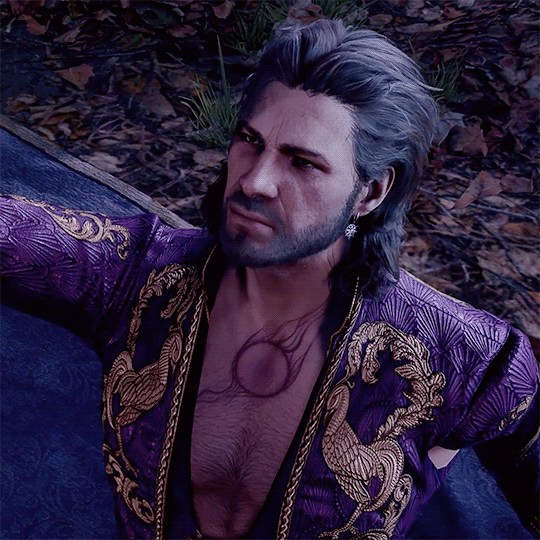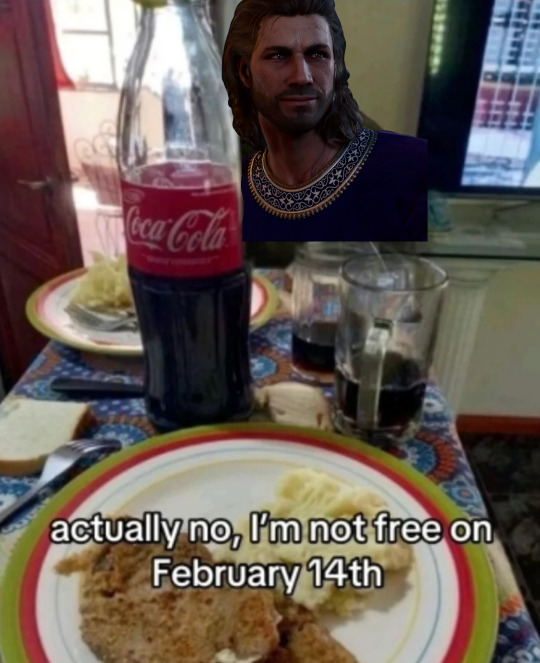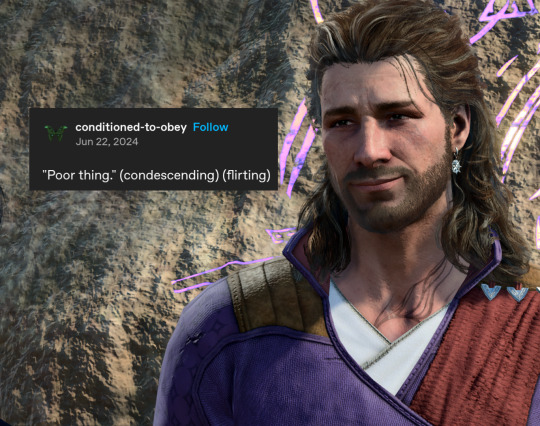Nana, She/Her, 18+, Minors DNI | Gale Dekarios side blog | RAAAAAHHHHHHHH
Don't wanna be here? Send us removal request.
Text

warmup and it needs to be mr.adonis himself.
[on bsky]
87 notes
·
View notes
Text
This post is a deep dive analysis of Gale’s motivations around ascension to godhood, comparing the information we get in a companion Gale playthrough to an origin Gale playthrough, and briefly considering the meta question of whether the latter can say anything definitive about the former. It got long – behind a cut for that reason.
The line in the whole game I’ve spent the most time thinking about is Gale’s when, in the boat scene, you ask him to clarify that he’s planning to ascend to godhood. His response is as follows.
‘No. Not like that. I don’t want to join them, I want to better them. A god’s powers paired with a mortal’s conscience, a mortal’s heart.’
Now, this is just on the face of it arrant nonsense, and what’s worse, you can’t ask him any follow-up questions to try to figure what the hell he’s talking about, so a lot of the following is extrapolation on my part. I can think of two possibilities for what he means.
Possibility one is that he intends to claim godhood-commensurate levels of power without being an actual god. I can see conceptually how this might be possible: godhood involves more than just power, it’s also about having worshippers and a domain and the right to claim souls in the afterlife and so on. So maybe he means that he wants to have enough power that he can do anything a god can do, but he doesn’t want to have all the other trappings of godhood that might interfere with him using that power on behalf of mortals. That would make sense of why he thinks he can do this while still retaining some aspects of his mortality.
Possibility two is that he does want to be a god, but a different kind of god. That would explain the ‘not like that’ – he’s not saying no to ascension, he’s just qualifying that he wants to become a kind of god who isn’t like all the other gods. It also fits better with the fact that if you encourage him to pursue this path, he does just go ahead and ascend to godhood without any apparent qualms.
The problem with both of these possibilities is that they are, like I said, obvious nonsense. There are a bunch of immediate objections. In the first scenario, it seems naïve at best to assume that he can run around with godlike power and not face any consequences for it. I am not a Forgotten Realms lore expert, but I know that Ao exists at least partly as a sort of regulatory force on gods and their actions; how can Gale be confident that Ao won’t step in and force him to either become a proper god or give up the crown and return to being an ordinary mortal? And even if not, the other gods will presumably have something to say about Gale wielding that kind of power without being bound by the responsibilities of godhood, and some will very likely see him as the sort of threat it’s in their best interests to try to neutralise. He’ll have godlike power, sure, but that’s no guarantee of safety, as anyone with even a passing familiarity with the Realms’ history should realise – and Gale has more than a passing familiarity. It’s not the ‘all our problems would be solved! We could do anything!’ silver bullet that Gale presents it as.
If the second scenario is what he means, it’s unclear how he thinks he can effect his ascension to godhood while retaining a mortal heart: whether he’s planning for some kind of qualitative difference in the ascension process or whether he just thinks he can retain his mortal’s heart by hoping for it really hard. And the thing about this possibility is that it’s not like it hasn’t been tried before. There are gods who have attempted to retain a sense of their humanity post-ascension, and Gale should absolutely know this, because Mystra is one of them. That’s one reason why she sleeps with her Chosen: she thinks it will help her hold on to her humanity. I don’t think her strategy has worked very well, but that’s all the more reason why Gale should see the problem with the idea.
But the fundamental issue with both possibilities is that becoming a god (or godlike being) who has a mortal’s heart is logically impossible. Having a mortal’s heart relies on being a mortal. If you’re suddenly a god, or even just in possession of godlike levels of power, you don’t have a mortal’s perspective any more. D&D gods are neither omniscient nor omnipotent. They’re capable of a lot of things, but they don’t have the power to do whatever they want, even setting aside regulatory forces like Ao. And having vast but still limited power means you’re now required to make trade-offs about what to do with it. You’re not omnipotent, so you can’t just solve all the world’s problems at a stroke. You have to decide how, where and when to use your power, and for the benefit of which mortals – and crucially, who not to help, because your power is needed elsewhere. And as soon as you start doing that you’re thinking like a god, not a mortal. It’s the kind of thinking that sees mortal lives as coins to be spent, that weighs up the costs of different courses of action and chooses a path based on the overall outcome and not on the dictates of a ‘mortal’s conscience’. It’s exactly what Mystra does, and what Gale himself rails against.
Gale is a smart guy. He should be able to spot at least some of these obvious issues with his plan. But he doesn’t – or at least, he doesn’t speak of them to you. So when I first played the boat scene, the question I wanted to answer for myself is whether he’s lying to himself or to the player. Most people, I think, assume it’s the former. But isn’t the latter also an intriguing possibility? The idea that he might be consciously aware, at least on some level, that he wants the crown for self-aggrandising and power-hungry reasons, but he knows that’s not going to fly with his lover, so he comes up with a way to spin his desires to look good and noble and in the interests of all humanity so he can get you on side? That interpretation does seem consistent with certain other aspects of Gale’s character. Just look at the existence of Sneaky God Gale.
If he were a non-POV character in a book, an analysis of his motivations would rely on the same things we use to analyse companion Gale: dialogue, actions, wider context. But in BG3, we have a potential extra window into what he might be thinking: the narration in an origin Gale playthrough, which (arguably) represents what’s going through his mind.
This immediately raises the fascinating (uh... to me, at least...) question of whether an origin Gale playthrough can say anything definitive about the internal thoughts and motivations of Companion Gale. On reflection, I actually think it can’t, for reasons I’ll get into in a minute. But let’s take a look at the scene I thought could shed more light on what he’s thinking: the one in which Origin Gale reads The Annals of Karsus. This is the moment in which he finally gets concrete, reliable information about the crown and its powers. It’s the moment in which his all his theories and speculations and wonderings coalesce into an actual plan. Here’s the relevant narration:
Narrator: Reunite the crown with the Dead Three’s Netherstones, and Karsus’ design might yet be completed. You could wield the power of a god. Player dialogue options: 1. The broken artefacts of a failed god. The crown should be destroyed, before it causes any more damage. 2. You always liked the idea of being worshipped. Adored. Obeyed... 3. Better not get ahead of yourself. The crown is still out of reach, for now. Subsequent narration if the player chooses option 2: Few mortals are truly capable of ascending to godhood. Karsus famously failed, but that doesn’t mean you would share his fate. After all, Mystra herself was once no more than a mortal wizard. She has no more right than any other. It’s time someone else had a go. Someone with more... ambition. Someone like you.
A couple of things strike me about this. The first is that the narrator says ‘wield the power of a god’, not ‘become a god’. This points to possibility one: he’s thinking of the power he’d wield and doesn’t necessarily want to pursue the trappings of godhood along with it. But the fact that one of the options for a response is that he always liked the idea of being worshipped and obeyed suggests he is aware that that crown would make him a god, not just grant him lots of power. It’s fascinating to me that this contradiction exists even at this level of his internal narration, without ever being acknowledged as a contradiction. It suggests to me that he’s got some cognitive dissonance going on, where he’s not really allowing himself to think straightforwardly about the idea of ascension. That, to me, points to ‘lying to himself’ and not ‘lying to the player’.
The other thing I find interesting is that the option where he decides to pursue godhood is framed around several different motivations, none of which have anything to do with wanting to make life better for other mortals. He likes the idea of being worshipped and adored, which speaks to both his desire to have his ego stroked and, potentially, his insecurities about being loved and his desperate need for someone to finally put him first (the way Mystra didn’t). He likes the idea of being obeyed, which is pretty straightforwardly power-hungry. He’s resentful of Mystra, and wants to get back at her and prove that he’s just as worthy of being a god as she is. And of course, he outright states the overarching theme of his ascent-to-godhood storyline: ambition. At no point does he express even a hint of the motivations he tells the player he has, about wanting to subvert the whole divine system and champion mortal causes and be a better person than the existing gods. His expressed motivations here are very clearly selfish ones.
If one believes that Origin Gale and Companion Gale are the same person and that Origin Gale narration is a definitive guide to Companion Gale’s internal monologue, then the obvious reading here is that Companion Gale is thinking along the lines of dialogue option 2: he wants to be worshipped and obeyed and to get back at Mystra, he knows that the player might have qualms about supporting him in such an obviously selfish and power-hungry goal, so he casts about for a reason why it’s actually a good thing for him to wield that power. He hits upon the idea that the gods treat mortals badly, and that pursuing the crown will allow him to even the score, and he slaps some noble-sounding bullshit about mortal hearts on top, and he goes off and pitches his plan to the player, conveniently not mentioning that by ‘the gods treat mortals badly’ he really means ‘Mystra treated me badly’, and by ‘we could act on behalf of mortals the way the gods are too cowardly to do’ he means ‘I could act on behalf of myself because I’d be powerful enough to do anything I wanted’. It’s a fundamentally manipulative and sneaky thing to do – and a shitty way to treat your romantic partner – but Gale isn’t above either manipulation or sneakiness.
However, as I said, I don’t actually think that Origin Gale is a definitive insight into Companion Gale, and the main reason why is that game mechanics get in the way. When the player is playing as Gale, the options necessarily have to be flattened to allow a positive game experience. You can see that in the three dialogue choices above: there’s a clearly noble and selfless option, a clearly power-hungry and selfish option, and a fence-sitting option for players who don’t want to make up their minds yet. That’s necessary because the player needs to understand which direction they’re taking the story in. If you introduce nuance around Gale pursing godhood because he genuinely wants to help mortals, and the player picks that option because they share those good intentions, and then the result is an ending where Gale turns out to be just another god like all the other gods and the game includes a bunch of hints that it’s the Bad Ending to boot, then the player is going to feel cheated and unsatisfied with their ending. From a game design perspective, you want the player to be surprised by the outcome of their choices but not the direction of their choices. You want the power-hungry choice to be signposted by dialogue options that are very clearly heading in a power-hungry direction. The details, and whether the eventual outcome works out well for the character or not, can remain a surprise to the player, but what you don’t want is for the player to choose that option because they think it’s a good-aligned choice and then receive an ending that tells them they were doing it for selfish reasons all along and now they’re getting their just desserts. That’s a recipe for frustration and a negative play experience.
And so where does that leave us on the question of whether Gale is lying to himself or the player? I don’t think the Origin Gale narration around his motivations can be said to be the full picture of what Gale as a character is thinking. I do think that the fact that the ambiguity about what, exactly, he’s planning on doing is still present even in Origin Gale’s internal thoughts says something about his character overall. So here’s my own personal, subjective answer (for today, at least) about what’s motivating Gale.
I think Gale is the kind of person who wants his actions to feel noble and justified even when he’s really behaving selfishly. I think he’s the kind of person who, when he argues for something, is primarily motivated by the desire to be right, and so he cherry-picks the arguments that support his thesis and he ignores or downplays evidence that contradicts it and he dismisses his opponents’ points even when they’re sound objections. I think that these traits are dangerous ones, and you can see both of them at play in the boat scene, as much as by what he doesn’t say as what he does.
I think he’s aware on some suppressed but still conscious level that his stated plans for the crown aren’t really either coherent or feasible, and that his motivations actually have a lot more to do with desire for power than he’s willing to admit. I think he’s deliberately not allowing himself to think about any of that, because to admit that he wants power selfishly is a threat to his self-image of someone who’s noble and justified and right, and his self-image is already balanced on a knife’s edge of gifted-kid-style hubris and insecurity, such that one wrong move is going to bring the whole thing crashing down.
I think you can see echoes in this scene of the way he talks about the orb in act 1, and what he did to inflict it on himself. When he confesses to you about the orb, he’s telling a story about what he did wrong, but it’s a story in which his motivations are on some level justified ones. He admits his own foolishness (in a vaguely self-flagellating way), but it’s still a grand story of a wizard too blinded by the desire for hidden knowledge and the need to impress his Goddess to recognise the pitfalls of what he was about to do. It doesn’t acknowledge the fact that by failing to consult Mystra he decided he knew what was best for her and her domain and her in-some-senses-literal body without treating her as an equal participant in the decision. It’s the story of someone who happened to be misguided but still had grand ambitions and understandable reasons for doing what he did. It’s a story that acknowledges that he was wrong but doesn’t really acknowledge that he was behaving badly. It fundamentally misses the point in a way that I think backs up my reading of him as ignoring the things he doesn’t want to think about in favour of spinning the kind of tale he wants to tell about himself and his motivations.
I also think there’s an aspect of his motivations that’s present in the boat scene but not when you play as origin Gale, and that’s his insecurity. That insecurity isn’t, to me, clearest in the direct dialogue you can have with him about it, where you reassure him that he’s enough for you as a man and he expresses slightly skeptical-sounding appreciation for your faith in him. I actually feel like the player avatar doesn’t quite have a handle on the true nature of Gale’s insecurities in this scene, and that neither they nor Gale have addressed it in a way that’s going to stick. Because to me, the most obvious sign of his insecurity here is that you can talk him out of pursuing the crown just by telling him you don’t want him to. You don’t have to muster up any argument other than ‘it turned out badly when Karsus did it’. Gale is someone who intellectualises things and likes debate and wants to be convinced by logic, and the fact that you can win the argument without even properly arguing is really telling. Because by the end of the scene, assuming you’ve tried to talk him out of using the crown, you haven’t actually convinced him that it’s the wrong thing to do. What you’ve done instead is tell him that this is a hill you’re willing to die on. And he’s so desperately frightened of losing you, he needs you to be with him so badly, that he gives up his plan without a murmur. That’s not, to me, a good thing. It’s not sweet that he cares about you that much. It’s not a heartwarming sign of his devotion. It’s like the possible origin Gale line to Mystra, where he tells her he didn’t use the orb because he has someone to live for now. That’s not good! He shouldn’t be living for you, that’s not healthy for him or you or your relationship. His security in himself needs to be something he does for himself, not something you provide him. I think you can maybe argue that he’s started the journey of finding that security by the end of the game in a good-aligned, mortal-ending playthrough. But he’s clearly a long way off it, and the fairytale happily-ever-after Galemance ending has, in my opinion, a giant crack right down the middle of it that Gale and his love interest ignore at their peril.
How to wrap all this up? I don’t think there’s one true interpretation of any character, and any analysis is going involve weighing up a whole bunch of contradictory things and deciding what weight to put on the different parts and what meaning to make out of them. Everyone’s take is different, and my takes are usually different from each other one month to the next. But these are some of the things I’ve been thinking about in my various Gale and Galemance playthroughs, and especially while writing my longfic about him. If anyone else has thoughts to share I’d love to hear them.
145 notes
·
View notes
Text





It’s Mermay! Last year I drew Visera as the seductive but deadly siren she is, and Gale as a professor who might like going for a swim with her. My early obsession with Atlantis and Pirates of the Caribbean makes me want to drop everything and make a pirate/fantasy comic. But alas, one project at a time.
The dialogue is from Stranger Things, in case you didn’t know!
2K notes
·
View notes
Text


Visera and Gale, the fictional couple I will never get over. I imagine this is the end of the conversation after Visera tries to break things off with Gale, afraid that her urges will cause her to hurt him. But he argues with a very long list of facts as to why her heart is good, and hopes that the longer he yaps, the sooner she’ll start to believe him.
621 notes
·
View notes
Text
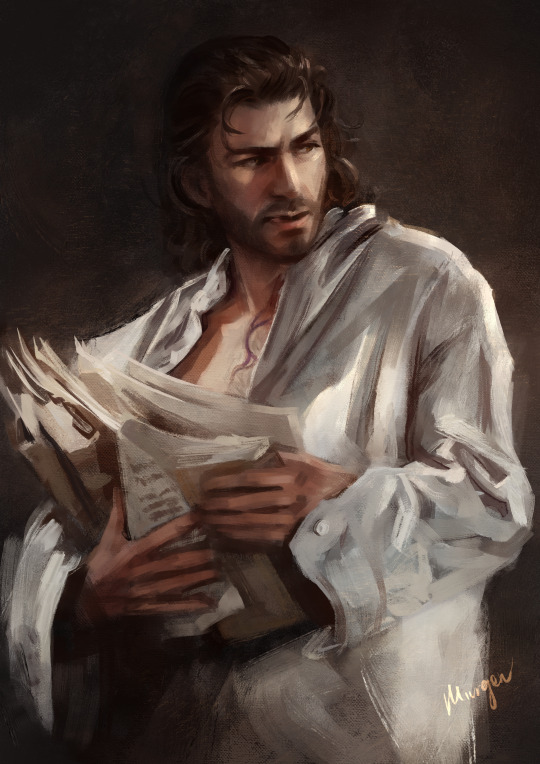
It was a good day for an unhinged Gale drawing :>
Edit: Okay, I shan't call it a doodle 😅❤️
(Twitter prompt)
8K notes
·
View notes
Text

Using Gale to practice a new brush style (and exaggerating his scar damage as usual)
1K notes
·
View notes
Text

Gale's emotion flow in Act 1 (and I love him)
4K notes
·
View notes
Text
Ugh remember modern setting Gale? I'm afraid it had to be done again


7K notes
·
View notes
Text
Professor Dekarios ?


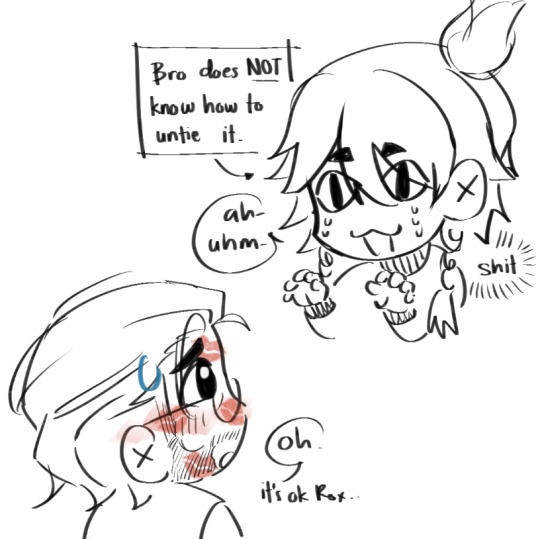
I love old man Gale ❤️💋.
737 notes
·
View notes
Text
Bloody Gale 🩸


bloody gale for a painting practice and also because the people yearn for gale covered in blood.
2K notes
·
View notes
Text
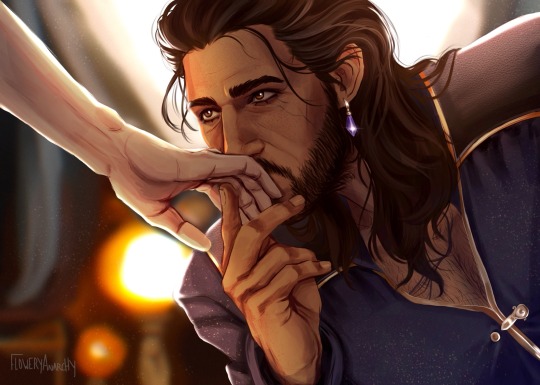
Happy Valentine’s Day!!❤️❤️❤️
Take a gale smooch
2K notes
·
View notes
